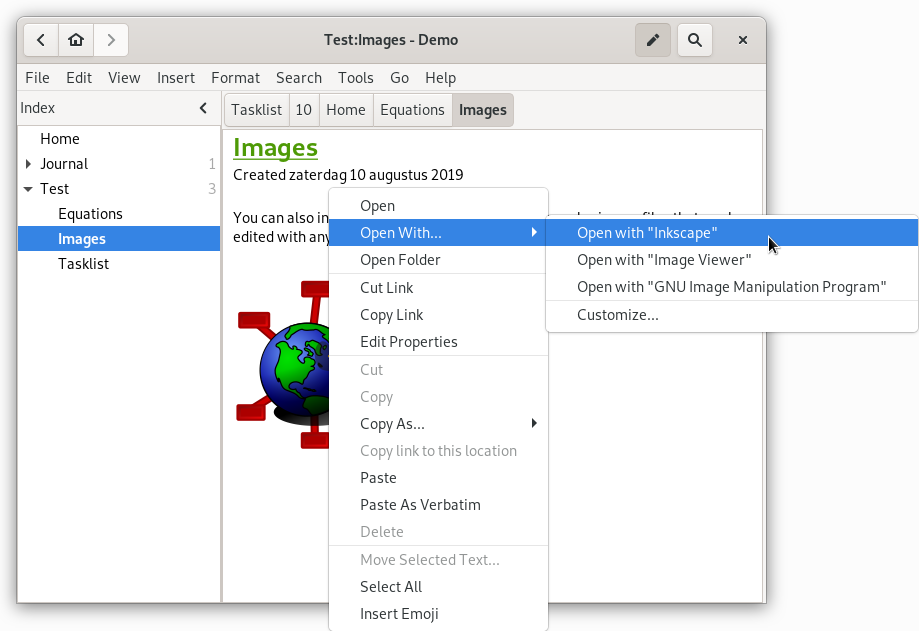Zim: A Free Desktop Wiki and Note App
Table of Content
Zim is an open source free lightweight note-taking application in a form of desktop wiki. It allows you to organize your notes, articles, resources, and ideas all in one place, connect them together using page links, attach media and documents and more.
By default, Zim supports wiki syntax and a long set of shortcuts keybindings that makes writing a pleasing experience.
It comes with a spell checker plugin, that you can enable or disable.

Furthermore, Zim grants you to create multiple notebook in any location of your choosing, backup it and restore it when needed.
You can also use it as a simple task list manager, personal organizer, and project tracker.
Zim Wiki Use Cases!
You can use it to:
- Keep an archive of notes
- Keep a daily or weekly journal
- Take notes during meetings or lectures
- Organize task lists
- Draft blog entries and emails
- Do brainstorming
Zim comes with a strong built-in search engine that looks through all of your notes, images, pages, and return accurate results. So, it is ok to have a large sum of notes.

With one click on your note, image, or attachment, within your Zim editor, you can choose which application you can open it with.
Zim is an ideal notepad for scientists, statisticians, and mathematicians, as it allows adding, editing and managing latex equation easily with an equation editor.
Journals are also a nifty tool to create a personalized journal entries inside your Zim app. It also comes with a built-in calendar that allows you quick access to your journal inputs.
If you wish you export your notes and publish them, you can easily export them as HTML and publish them on any web server, or free service like GitHub pages.
Plugins
Zim also is a modular app that allows you to extend its functionality by installing plugins, create custom tools, conversion scripts, and page templates.
In the following a quick list for the most important plugins
- Attachment browser: this plugin allows you to browse and search all of your attachments in one place.
- Command Palette: It is something like VS Code command place, where you can start it quickly and run your commands.
- Gnuplot Editor: a Plot creator and editor
- Inline calculator: This plugin allows you to evaluate simple mathematical expressions in zim.
- macOS Menubar: Allows better macOS native support.
- Link map: allows an alternative view of the internal organization of a notebook.
- Quick note: offers a dialog for inserting quick notes into a notebook. It can be invoked from the command line and can therefore easily be bound to keyboard shortcuts or used in scripts.
- Tags: adds a tag cloud and a page index organized by tags in the side pane.
- Table editor: Add and edit tables inside your content.
- Spell checker
- Distraction free editor: adds settings that help using zim as a distraction-free editor.
- Page Index: provides the page index side pane for the main window.
- Tasks list: Task List plugin adds a dialog that lists open items across all pages of the current notebook.
- Insert a quick screenshot: adds a dialog that allows you to take a screenshot of the desktop or a particular window and directly insert the image into the current ZIM page.
- Table of content (ToC)
- Sequence Diagram editor
- Print to the browser
- Arithmetic: This plugin allows you to evaluate arithmetic expressions in a zim page.
- Source view
Platforms
- Linux: Many Linux distros such Ubuntu, Arch, Debian, Fedora has Zim ready to install from their officials repos.
- Windows: Zim Windows installer is available, and it works from Windows 7, through 8, 8.1, 10 and later.
- macOS: Zim offers macOS DMG packages for arm64 and x86_64.
License
The Zim desktop wiki project is released under the GPL-2.0 license.
Zim is an open-source program. This means it can be used and distributed freely under the conditions of the license.
All files in this package, except for those mentioned below, are copyrighted by Jaap Karssenberg.











